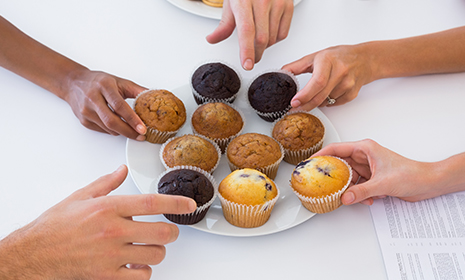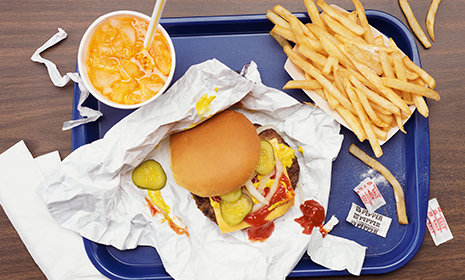This article is written by psychologist Dr Jen Nash, who has Type 1 diabetes.

Eating 9-5, what a way to make a living...
Most of us have been there… sharing in the office cakes and treats, snacking at our desks as we work, feeling the 4pm slump and reaching for a chocolate bar, loading up on sugary coffees and caffeinated drinks to stay awake...
Sound familiar? Our modern working lives mean food can be a common feature in the workplace.

If you often find yourself eating extra food at work, you are likely to notice an unhelpful impact on your diabetes management.
Avoid the trappings of on-the-job snacking
This feature will help you to recognise this behaviour happening, and help you to make different choices if you choose to. If you’re not working, there may also be some information of value, as statistics show that a large proportion of unemployed and retired individuals in the UK are also likely to have a sedentary lifestyle.

Office eating antics
Rewind the clock 20+ years ago and workplaces just didn’t have the same array of enticing snacks and treats – the explosion of delicious snack foods and the culture of ‘food as a treat’ has really infiltrated our modern workplaces.
Even when we’re trying to make healthy choices, co-workers can put the pressure on to ‘join in’ with their eating - ‘go on, one won’t hurt you!’ - and there can even be a subtle feeling of rejection in the air if we hold our ground and say ‘no’.

Many of us get a sense of connection and bonding when we eat with others, so food is rarely just about solving hunger.
Eating through workplace stress
Stress can also be a big influencer; feeling in control of our lives is an important part of being human, and as funny as it sounds, if we’re working on a complex work problem that we can’t master, the feeling of being able to master the muffin, burger or fizzy drink can help us feel more in control of this feeling of frustration.
And, of course, in all the tasks that might be overwhelming us, food is also a small piece of much-needed ‘me-time’, and can provide some relief from boredom if we are involved in dull or monotonous tasks.

Work can be engrossing - in ways both good and bad - and some people can get lost in a task and forget to eat.
This may mean that when they do, they’re more likely to be ravenous and grab whatever is close to hand to solve the hunger problem.
From a practical perspective, with all that has to be accomplished in the working day, we might feel as if we haven’t the time to prioritise the preparation of healthy snacks and lunches, or are too busy to go out to buy something fresh and healthy.

Lifestyle and adverse effects
It’s not only the case for those with a 9-5 desk job. Similar habits can develop as a result of working long hours, operating on night shifts, being constantly on your feet, or travelling for business.
Changes to routine can easily lead to forgetting to regularly test blood glucose and the timing of taking diabetes medication can also be affected.
Warrior in the workplace
So, how can you begin to take some positive steps if you’re inspired to make a change?
- Put a reminder on the hand or wrist of your dominant hand (this is the one you write with, and the one you are most likely to use to reach for food), so you’re reminded to ask yourself, ‘Am I hungry for food, or something else?’
- You may want to talk to your colleagues about how food ‘shows up’ in the workplace. Could you ask a friend to remind you to pause and think about whether the sweet treat is what you want?
- Could you come up with some creative ways to have a break or a treat in the workplace, that doesn’t involve eating? Imaginative ideas I’ve heard include telling each other jokes, finding ‘teach yourself to dance’ video clips and spending 5 minutes learning a new move together and giving each other a 1 minute shoulder rub or hand massage. Pin a list up in the kitchen and see how inventive you can get.
 If you’re someone who forgets to eat, experiment with setting your phone alarm to remind you to eat, or asking a colleague who is a regular eater to prompt you.
If you’re someone who forgets to eat, experiment with setting your phone alarm to remind you to eat, or asking a colleague who is a regular eater to prompt you.- Experiment with a rule to eat fruit first (or any healthier choice) and then, if you’re still hungry, go aheadand eat.
- Remember the more general lifestyle advice, such as taking the stairs instead of using the lift, and walking instead of driving to appointments when you can.

Start your change today
Could you try just one of these strategies in the week to come? If you work full time, it’s likely you spend the majority of your waking week at work. So, if you can, it’s worth investing some time in making your job work for you and your health goals.
Thanks to anti-discrimination employment practices, diabetes shouldn’t be holding anyone back in the workplace, so do whatever you can to feel in control of the food environment at work, too.

Always try and give yourself the best chance to manage your diabetes, whether at work or not.
